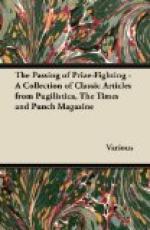“Next we come to the ’ead. On the south side of the ’ead we discover the mouth. The ’orse’s mouth was constructed for mincing ’is victuals, also for ’is rider to ’ang on by. As the ’orse does the other forty-five per cent. of ’is dirty work with ’is mouth it is advisable to stand clear of that as well. In fact, what with his mouth at one end and ’is ’ind-legs at t’other, the middle of the ’orse is about the only safe spot, and that is why we place the saddle there. Everything in the Harmy is done with a reason, gentlemen.
“And now, Number Ten, tell me what coloured ‘orse you are ridin’?
“A chestnut? No ’e ain’t no chestnut and never was, no, nor a raspberry roan neither; ’e’s a bay. ’Ow often must I tell you that a chestnut ’orse is the colour of lager beer, a brown ’orse the colour of draught ale, and a black ’orse the colour of stout.
“And now, gentlemen, stan’ to yer ’orses, ’pare to mount—mount!
“There you go, Number Seven, up one side and down the other. Try to stop in the saddle for a minute if only for the view. You’ll get yourself ’urted one of these days dashing about all over the ’orse like that; and ’sposing you was to break your neck, who’d get into trouble? Me, not you. ’Ave a bit of consideration for other people, please.
“Now mind the word. Ride—ri’—tur-r-rn. Walk march. Tr-a-a-at. Helbows slightly brushing the ribs—your ribs, not the ’orse’s, Number Three.
“Shorten yer reins, ’eels down, ’eads up, ’ollow yer backs, four feet from nose to croup.
“Get off that mare’s neck, Number Seven, and try ridin’ in the saddle for a change; it’ll be more comfortable for everybody.
“You oughter do cowboy stunts for the movin’ pictures, Number Six, you ought really. People would pay money to see you ride a norse upside down like that. Got a strain of wild Cossack blood in you, eh?
“There you are, now you’ve been and fell off. Nice way to repay me for all the patience an’ learning I’ve given you!
“What are you lyin’ there for? Day-dreaming? I s’pose you’re goin’ to tell me you’re ‘urted now?’ Be writing ’ome to Mother about it next: ’DEAR MA,—A mad mustang ’as trod on me stummick. Please send me a gold stripe. Your loving child, ALGY.’
“Now mind the word. Ride—Can—ter!”
He cracks his whip; the horses throw up their heads and break into a canter; the cavaliers turn pea-green about the chops, let go the reins and clutch saddle-pommels.
The leading horse, a rakish chestnut, finding his head free at last and being heartily fed-up with the whole business, suddenly bolts out of the manege and legs it across the meadow, en route for stables and tea. His eleven mates stream in his wake, emptying saddles as they go.
The ten little gamins dance ecstatically upon the bank, waving their shirts and shrilling “A Berlin! A Berlin!”




